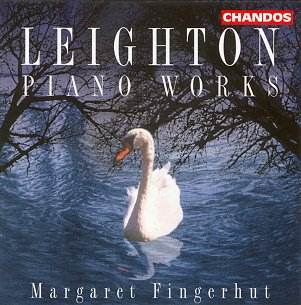KENNETH LEIGHTON
Sonatina No.2 Op.1b
Fives Studies Op.22
Fantasia Contrappuntistica Op.24
Pieces for Angela Op.47
Four Romantic Pieces Op.95
 Margaret Fingerhut
(piano)
Margaret Fingerhut
(piano)
 CHANDOS CHAN
9818
CHANDOS CHAN
9818
Crotchet

By all counts Kenneth Leighton was a fine pianist and throughout his composing
life he regularly wrote for the piano. His first acknowledged works are the
two sonatinas written in 1946 and 1947 (respectively Op.1a and Op.1b) and
one of his very last works is the Four Romantic Pieces Op.95 written
in 1986 which the composer first performed in 1987 and which he recorded
for the B.M.S. somewhat later. In the intervening years his piano output
grew steadily including a number of considerable achievements such as the
Five Studies Op.22, the Fantasia Contrappuntistica Op.24, the two
"numbered" sonatas (Op.2 - 1948 and Op.17 - 1953), three sets of variations
(Op.30 - 1955, Op.36 - 1959 and Op.56 - 1969) and the magnificent Sonata
Op.64 of 1972.
As Bryce Morrison observes in his excellent notes, "the fecundity, variety
and inventiveness of his writing suggest not only a lively if often dark
imagination but a scope given to remarkably few British keyboard composers".
In Leighton's piano music there is as much continuity as variety.
This chronologically laid-out recital usefully presents an excellent survey
of Leighton's music over a span of nearly forty years. Rhythmic liveliness
is present from first to last - note the outer movements of the youthful
Sonatina No.2 as well as the last movement of the Four Romantic Pieces,
a powerful Toccata in all but the name. Similarly the lyrical strains of
the slow movement of the Second Sonatina are much in evidence in the slower
sections of the other works albeit in deeper, richer vein.
Sentiment is never absent from Leighton's music though it may have some Northern
ruggedness which eschews any superficial sentimentality. Thus the Five
Studies open with a powerful prelude followed by two lighter, more animated
movements leading into the emotional heart of the work, i.e. the long, searching
fourth study, the tension of which is partly relieved by the final Toccata.
The mighty Fantasia Contrappuntistica which won its composer the Busoni
Prize is yet another example of a carefully crafted piece which may be considered
as one of the main milestones in Leighton's piano music.
Pieces for Angela (1966) is a set of eight short, compact pieces for
gifted amateurs and might thus be compared with Walton's delightful Music
for Children. However things are never as simple as that. Whereas Walton
drew on the imagination of children's games and emotions, Leighton digs deeper
into his own psychology and Pieces for Angela have a terseness and
at times an austerity quite alien to children and to Walton.
Leighton recorded his Four Romantic Pieces for the B.M.S. It was then
clear that he was in full command of his craft both as a composer and as
a performer. The four pieces constitute another sizeable achievement equalling
some of the preceding piano works. Romantic they are but in Leighton's inimitable
way. To quote Bryce Morrison again, "Leighton's music is, indeed, distinctive
music which satisfies the intellect as it liberates the spirit".
What else can be added? Margaret Fingerhut plays beautifully throughout and
this CD is yet another well-deserved tribute to a most distinguished composer
whose death in 1988 was a great loss indeed.
Hubert Culot
See also review by Colin Anderson
